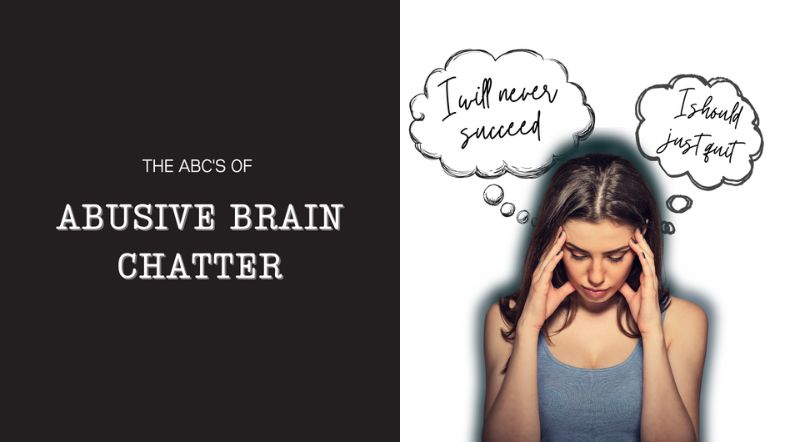Lovework:
Grab your journal and list three moments from today when your inner voice turned critical. Then, rewrite each moment as if you were speaking to a dear friend. Notice how different it feels.
If you’ve ever caught yourself thinking, “I’m not good enough” or “I always mess things up,” you’ve already met Abusive Brain Chatter™. I call it ABC for short—the loud, judgmental voice inside your head that bullies, belittles, and gaslights you. It’s the part that compares you to others, keeps you stuck in fear, and convinces you that you’re somehow less than.
ABC is sneaky. It can sound logical, even helpful, as if it’s protecting you from disappointment. But underneath, it’s emotional self-abuse. It drains your confidence, energy, and joy. The truth is, this voice isn’t who you are—it’s a pattern you learned somewhere along the way. And if it was learned, it can be *unlearned.*
You can train your brain to speak with compassion instead of criticism. That’s what this journey is all about.
“The most dangerous voice is the one in your head—until you teach it to speak with love.”

You might not even realize you’re living with ABC. It hides in everyday moments—like when you scroll social media and suddenly feel small, or when you replay a conversation over and over, wishing you’d said something different.
Here are some signs you may be dealing with Abusive Brain Chatter:
- You criticize yourself harshly or call yourself names.
- You chase perfection and feel like nothing is ever “good enough.”
- You replay mistakes and magnify them into disasters.
- You people-please, apologize too often, or avoid conflict.
- You compare yourself to others and feel like you’re falling short.
- You overwork to prove your worth and end up exhausted.
- You avoid opportunities because you’re afraid you’ll fail.
- You feel like a fraud, even when you’ve earned your success.
- You second-guess yourself constantly and seek reassurance.
- You isolate or shut down when you feel criticized.
If any of these sound familiar, you’re not broken—you’re human. You’ve just developed a habit of self-doubt that can be replaced with self-kindness.
Grab your journal and list three moments from today when your inner voice turned critical. Then, rewrite each moment as if you were speaking to a dear friend. Notice how different it feels.
ABC doesn’t just live in your mind—it shows up in your body, too. You might notice:
- A heavy feeling of shame or guilt that never seems to lift.
- A racing mind that won’t turn off at night.
- Tension headaches, stomach knots, or tight shoulders.
- Constant worry, irritability, or fatigue.
- The sense that you’re stuck in survival mode.
Our bodies keep score of the stories our minds tell. When the chatter turns cruel, your whole system feels it. The good news? The body also responds beautifully to kindness and calm. You can teach it to relax again.
“Your body listens to every thought you think. Make sure your words are ones it wants to hear.”

Abusive Brain Chatter can quietly chip away at your self-esteem and your dreams. It limits what you believe is possible and keeps you in a loop of overworking, avoiding, and doubting yourself.
But here’s the truth: You don’t have to keep living with that inner bully. Getting help isn’t a sign of weakness—it’s an act of courage. With support, you can:
- Learn tools to calm your nervous system and stop overthinking.
- Rebuild self-trust one small, compassionate step at a time.
- Strengthen emotional resilience through self-forgiveness.
- Make choices guided by love, not fear.
You deserve peace of mind. You deserve to feel safe inside your own head.